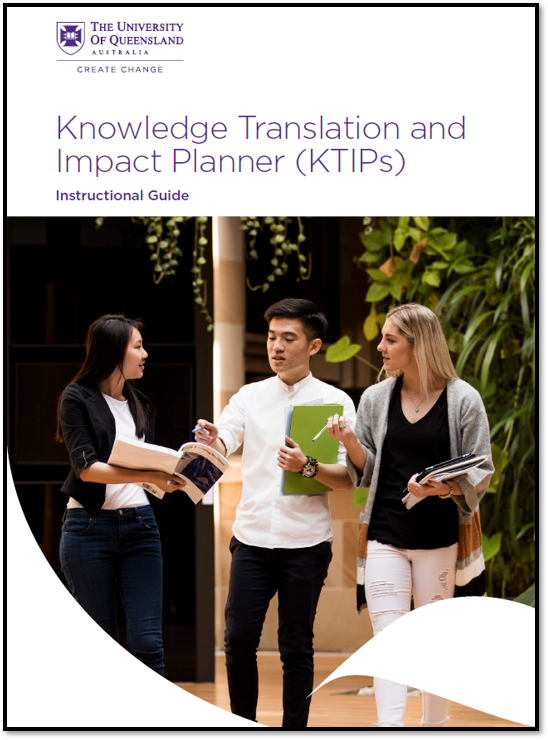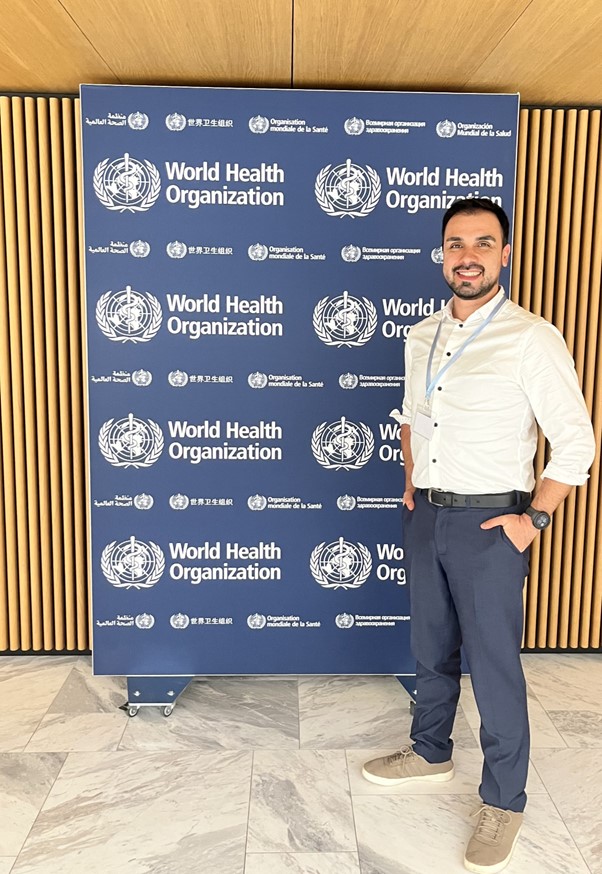Knowledge Translation and Impact
The Knowledge Translation and Impact Research and Engagement Theme (KT & Impact RET) aims to capture the outstanding work done in SHRS to translate research evidence into practice, resulting in meaningful impacts on knowledge, health and on society. It also strives to promote excellence in the future practice and science of knowledge translation.
The theme uses the following definition of knowledge translation:
This theme is relevant to all SHRS disciplines (audiology, occupational therapy, physiotherapy and speech pathology) and works together with all other SHRS research themes. It recognises knowledge translation as fundamental to the school’s teaching, research and clinic work and as a core focus of all our staff and students.
Knowledge Translation and Impact Planner (KTIPs)
KTIPs Instructional Guide
 The KTIPs Instructional Guide is an extensive, explanatory booklet that guides you through the knowledge translation and impact planning process. It contains information based on the literature and includes open-ended questions and checklists to prompt your thinking through key aspects of knowledge translation and impact planning for your project or program of research, as well as examples and appendices with additional resources and links.
The KTIPs Instructional Guide is an extensive, explanatory booklet that guides you through the knowledge translation and impact planning process. It contains information based on the literature and includes open-ended questions and checklists to prompt your thinking through key aspects of knowledge translation and impact planning for your project or program of research, as well as examples and appendices with additional resources and links.
KTIPs Planning Template
The KTIPs Planning Template is designed to accompany the KTIPs Instructional guide. It can be completed electronically and is a place to document your plans as you progress through the accompanying KTIPS Instructional guide.
KTIPs Introductory Video
The KTIPs Introductory Video is a brief video which provides an introduction and overview of the KTIPs designed to orientate users about how to use the resource.
Co-creating virtual environments with consumers to enhance self-awareness and preparedness for home after brain injury
This project will take forward priorities identified by people with TBI and clinicians and the virtual reality tools co-created will build in evidence-based feedback approaches. This project will co-design the virtual reality tools with consumers, rehabilitation practitioners and technology experts and explore their feasibility, efficacy and implementation in a hospital brain injury rehabilitation setting.
The Aphasia Implementation Toolkit Project: Developing an implementation intervention to improve services for stroke survivors with aphasia
This project will incorporate principles of behaviour change theory and co-production to develop much-needed implementation support to address the national priorities for aphasia services. Overall, the project seeks to improve provision of clinical aphasia services, in order to improve outcomes for people living with aphasia.
The FISS-Australia trial: The clinical and cost effectiveness of the Action Falls rehabilitation programme compared to usual care alone to reduce falls in stroke survivors
The Australian Falls In Stroke Study (FISS-Australia) is a national, multi-centre, randomised controlled trial that will determine the effectiveness and cost-effectiveness of the Action Falls intervention in stroke survivors who are discharged from hospital to home.
Chair
Kirstine Shrubsole , NHMRC Emerging Leadership Fellow in Speech Pathology
Co-chair
Emmah Doig, Conjoint Senior Research Fellow
Academic staff
- Sally Bennett, Professor in Occupational Therapy
- David Copland, Professor in Speech Pathology
- Louise Hickson, Executive Dean, Faculty of Health and Behavioural Sciences
- Leanne Johnston, Honorary Associate Professor
- Trevor Russell, Professor, Director RECOVER Injury Research Centre
- Katrina Williams, Senior Lecturer in Physiotherapy
- Lucy Thomas, Senior Lecturer in Physiotherapy
- Caitlin Hamilton, Lecturer in Occupational Therapy
- Tomomi McAuliffe, Lecturer in Occupational Therapy
- Georgina Clutterbuck, Lecturer in Physiotherapy
- Wei Qi Koh, Lecturer in Occupational Therapy
- Terra Bredy, Associate Lecturer
- Alice Jones, Honorary Professor and casual academic
- Ray Lang, Casual Academic
Research staff
- Sarah Wallace, NHMRC Senior Research Fellow
- Michelle King, Research Fellow
- Megan Auld, Honorary Research Fellow
- Yanfei Xie, Postdoctoral Research Fellow
- Marie-Pierre Cyr, Postdoctoral Research Fellow
- Megan Ross, Research Fellow
- Sarah Prescott, Research Fellow
- Sally Zingelman, Postdoctoral Research Fellow
Conjoint staff
- Jacki Liddle, Conjoint Associate Professor in Occupational Therapy
- Elise Gane, Honorary Research Fellow in Physiotherapy
Clinic staff
- Maree Maloney
- Denis Guguere
- Anna Pearson
HDR students
Candidate | Degree | Supervision | Project Title/Description |
|---|---|---|---|
| Karen Graham | PhD | Dr Georgina Clutterbuck, Associate Professor Leanne Johnston and Dr Katarina Ostojic (University of Sydney) | Children with Disability Make a SPLASH: Codesigning a Universal Aquatic Inclusion Toolkit |
Arifuzzaman | PhD | Associate Professor Asaduzzaman Khan | Non-Communicable Disease prevention for Universal Health Coverage. |
Sebastian Gallegos-Berrios | PhD | Dr Freyr Patterson (Principal) Professor Jodie Copley | This thesis addresses the practices of Chilean occupational therapists in treating patients with acquired brain injury (ABI). It explores local treatment strategies, describes implementation, identifies practice gaps, and highlights the cultural context's impact. The aim is to propose enhancements to improve clinical practices and patient well-being in Chile, fostering more effective occupational therapy interventions. |
Md. Mahmudul Hasan Sagar | PhD | Associate Professor Asaduzzaman Khan (Principal Investigator) Dr Mohammad Ali Moni (Associate Investigator) | Sports Participation of Culturally and Linguistically Diverse Children and Adolescents in Australia |
| Anjana Rajagopal | PhD | Associate Professor Asaduzzaman Khan Associate Professor Elizabeth Edwards Associate Professor Alina Morawska | A family-based intervention to promote healthy screen use in Australian adolescents |
| Anna Humphreys | PhD | Professor David Copland, Dr Jade Dignam, Dr Kirstine Shrubsole, Dr Marie-Pier McSween | Implementation and Effectiveness of Comprehensive High-Dose Aphasia Treatment (CHAT Partnership). |
| Woon Ki Chew | PhD | Professor David Copland Professor Emma Power Dr Kirstine Shrubsole Dr Marie-Pier McSween | Evaluating the implementation fidelity of the Comprehensive High-dose Aphasia Treatment (CHAT) program in Australian rehabilitation services |
| Claire Reilly | PhD | Dr Jeanne Marshall, Dr Rebecca Packer, Dr Jasmine Foley, Professor Nikhil Thapar | The decision making of temporary tube feeding in paediatric patients |
| Nishani Algama | PhD | Dr Monique Waite, Dr Felipe Retamal Walter Professor Nerina Scarinci | Connected to Care: Enhancing Telehealth in Allied Health to bridge gaps in Regional and Remote Queensland |
Publications
Planning for change: co-designing implementation strategies to improve the use of sensory approaches in an acute psychiatric unit
Implementing sensory approaches in psychiatric units has proven challenging. This multi-staged study involved qualitative interviews (n = 7) with mental health care staff in an acute psychiatric ward to identify the local factors influencing use of sensory approaches, and co-design implementation strategies with key stakeholders to improve their use.
View the publication on UQ eSpace
Survey of academic staff and higher degree research students in a university school of health and rehabilitation sciences about practices, attitudes, knowledge and confidence in knowledge translation and communicating impact
Universities are major producers of research evidence, and timely translation and uptake of evidence to sectors such as healthcare is imperative to inform best practice. Knowledge translation (KT) is complex and there is increasing awareness of the need for KT to facilitate Iievidence-informed changes, with grant funders increasingly requiring researchers to demonstrate KT and research impact. Despite this, there is little research about KT in university settings related to healthcare research.
View the publication on UQ eSpace
Improving the use of sensory approaches in an acute inpatient mental health unit using a co‐designed multifaceted implementation strategy. International Journal of Mental Health Nursing
Despite the therapeutic benefits of sensory approaches being well documented, little research has focused on improving their implementation in acute mental health units. The use of implementation frameworks to improve the use of evidence-based practices has shown promising results in healthcare; however, there is little evidence for their use in acute mental health units.
View the publication on UQ eSpace
News
In May 2025, Dr Wei Ki Ko was featured in a news article about her work in aged care setting to implement pet robots
In May 2025, Sebastian Gallegos Berrios had the opportunity to participate in a meeting organised by the World Health Organization (WHO) in Geneva, contributing to the review and prioritization of assistive products for the update of the WHO Priority Assistive Products List.

View the official WHO news article
In July 2025 Dr Jeanne Marshall presented on an episode of the Feeding Does Matter podcast series, exploring the role of responsive feeding therapy in supporting children with paediatric feeding disorders and ARFID (Avoidant/restrictive food intake disorder).
Members of the KT & Impact RET work with various partners to achieve high quality outcomes. Our researchers collaborate actively in both clinical and research settings, with ongoing projects with internal, external, and international universities, along with industry partners and consumer organisations.
UQ partners
- Surgical Treatment and Rehabilitation Service (STARS) Education and Research Alliance, The University of Queensland and Metro North Health
- RECOVER Injury Research Centre
- QLD Brain Institute, The University of Queensland
- Queensland Aphasia Research Centre, QARC
- Children’s Motor Control Research Collaboration, School of Health and Rehabilitation Sciences, The University of Queensland
- Dementia & Neuro Mental Health Research Unit, The University of Queensland Centre for Clinical Research
External partners
Enquiries
For all enquiries related to research in the School, contact the Senior Administration Officer (Research): research.shrs@uq.edu.au
For all enquiries related to joining the Knowledge Translation and Impact Research and Engagement Theme contact the chairs Dr Emmah Doig and Dr Kirstine Shrubsole.
For all general current HDR student queries and enquiries related to applications contact the HDR Liaison Officer: hdr.shrs@enquire.uq.edu.au.
